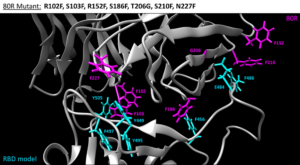Supercomputing, big data and artificial intelligence are crucial tools in the fight against the coronavirus pandemic. Around the world, researchers, corporations and governments are urgently devoting their computing resources to this global crisis. This column collects the biggest news about how advanced technologies are helping us fight back against COVID-19.
Australia joins the COVID-19 HPC Consortium
Two major Australian supercomputer centers — NCI Australia and the Pawsey Supercomputing Centre — have joined the U.S.-led COVID-19 High-Performance Computing Consortium. The two institutions joined the consortium as a collaborating initiative: the Australian HPC COVID-19 Rapid-Response. “The global threat of COVID-19 demands that national and international experts work together to understand the virus, mitigate its spread and develop a vaccine,” said Mark Stickells, director of Pawsey. The new Australian consortium participants join international participants from Korea, the UK, Switzerland, Sweden, Japan and more. To read more, click here.

Folding@home leverages Advanced Clustering, AMD CPUs for COVID-19 research
Since early in the pandemic, crowdsourced research computing platform Folding@home – which allows anyone to donate their computer’s idle time to protein research – has been crunching the proteins of the coronavirus. Now, Folding@home has enlisted Advanced Clustering Technologies (a custom HPC cluster manufacturer) to help provide solutions for analyzing the data that results from the simulations.“We are bringing in 6TB of data per hour,” Bowman said. “It’s a huge amount of data to analyze, so we need significant hardware on our end to run the analysis. To read more, click here.
UVA leads nationwide project to protect health data used in pandemic research
The University of Virginia (UVA) has received a $1.2 million grant expansion from the National Science Foundation to help protect health data used in COVID-19 research. The grant builds on the initial $2.5 million grant awarded in 2019, which allowed UVA to establish the Virginia Assuring Controls Compliance of Research Data (Virginia ACCORD) program. UVA hopes that the expanded program, called ACCORD-COVID, will help smaller institutions comply with health data privacy laws and conduct more COVID-19 research. To read more, click here.

Supercomputer research probes reengineering old antibodies to fight SARS-CoV-2
With SARS-CoV-2 sweeping the globe, some researchers are looking back to SARS-CoV-1 for answers. Victor Padilla-Sanchez of the Catholic University of America used supercomputers to conduct detailed simulations of antibodies that had proved effective against the original SARS virus to see if they could prove effective against the novel coronavirus. While the research is ongoing, Padilla-Sanchez believes that the antibodies could be rendered effective with a handful of amino acid substitutions. To read more, click here.
Researchers use HPC to uncover signs of ‘Bradykinin storm’ that may explain COVID-19 symptoms
COVID-19 has proven responsible for a wide range of symptoms ranging from the predictable to the baffling – and now, thanks to supercomputer-powered analysis, researchers may have an explanation. The research, led by Dan Jacobson of Oak Ridge National Laboratory, scrutinized the genes of cells from the lung fluid of COVID-19 patients, uncovering signs of a “Bradykinin storm” that may explain symptoms like muscle pain, fatigue, headaches and brain fog in COVID-19 patients. To read more, click here.
Neocortix brings Arm support to Folding@home, Rosetta@home
Normally, Neocortix offers distributed cloud computing on crowdsourced smartphones, but it saw an opportunity to do some pro bono work with the advent of Folding@home and Rosetta@home’s COVID-19 research. The team at Neocortix helped the crowdsourced computing organizations bring support for Arm CPUs to their workflows, opening the door for billions of new devices to contribute idle processing time to COVID-19 research. To read more, click here.
VA, DOE, HHS announce COVID-19 Insights Partnership
The U.S. Departments of Veteran Affairs (VA), Energy (DOE) and Health and Human Services (HHS) have announced the formation of the COVID-19 Insights Partnership, which will allow the agencies to better coordinate and share health data, research and expertise relating to COVID-19. The departments say that the research analysis conducted by the Insights Partnership will “focus on vaccine and therapeutic development and outcomes, virology and other critical scientific topics[.]” To read more, click here.
Ohio Supercomputer Center researchers build COVID-19 projection models
Researchers at the Ohio Supercomputer Center have been using their supercomputing resources to build pandemic projection models for their home state. In an article from the center, researchers involved with the models described how they were built and how they were used by state agencies – including the governor of the state. To read more, click here.
Do you know about COVID-19 research that should be featured on this list? If so, send us an email at [email protected]. We look forward to hearing from you.




























































